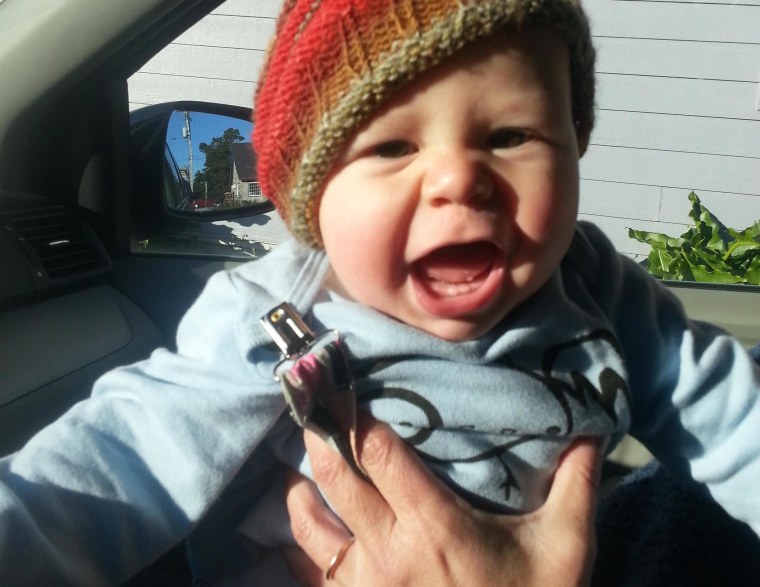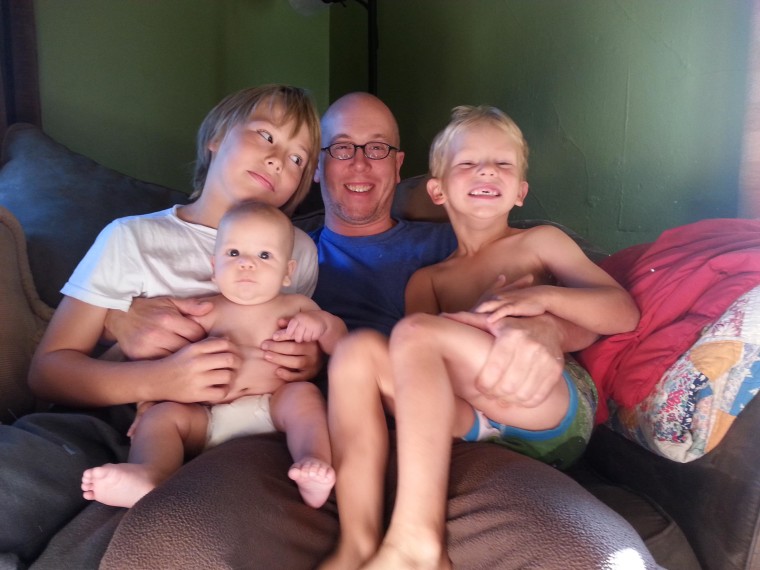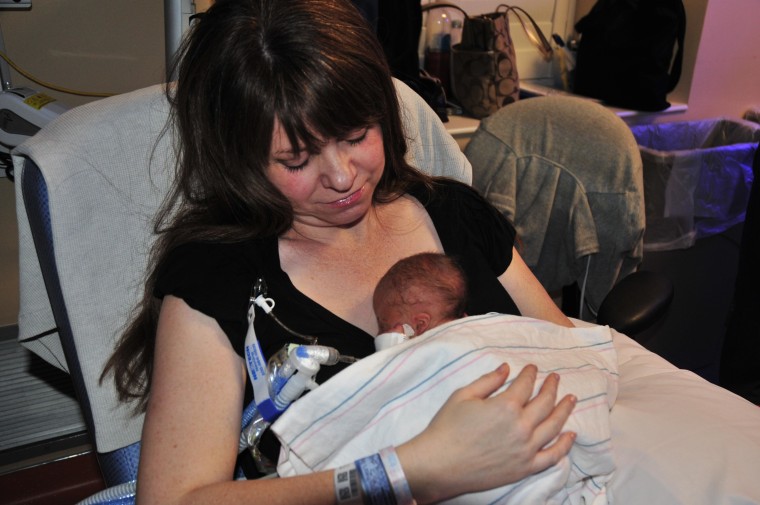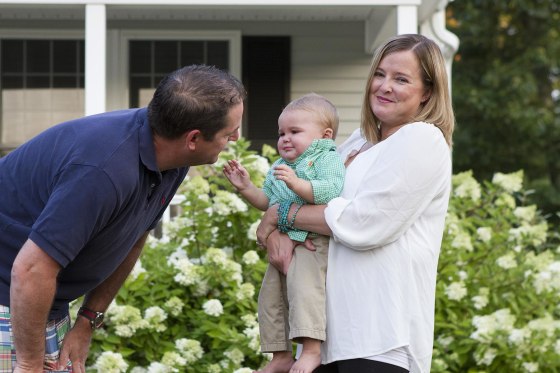Zachary Diamond and Angie Nunes look at their “wonderfully healthy” 6-month-old son Solomon, knowing they might have terminated the pregnancy — all because of a popular prenatal test that was wrong.
The Portland, Oregon, couple was encouraged to use a new noninvasive blood test that their doctor said was “99 percent” accurate in predicting chromosomal abnormalities.
The test revealed the fetus had Trisomy 18 or Edwards syndrome, a painful genetic condition that is nearly always fatal, and their doctor told them to prepare for the worst.
“If you google Trisomy 18, your heart will just shatter with the prognosis,” Diamond, 38, told NBC News. “The prognosis is godless, just awful. Angie was crying on the sofa for hours on end.”
Nunes, 39, has muscular dystrophy and worried about how they could care for a child with such severe disabilities. Only after a 16-week ultrasound and a second screening test did doctors realize she was probably carrying a normal baby.

Hundreds of thousands of pregnant women have used these noninvasive prenatal tests since they appeared on the market in 2011, with little reason to doubt their effectiveness. And indeed, studies have found the tests to be more accurate than standard screening.
But positive results can be wrong 50 percent or more of the time. And an investigation by the New England Center for Investigative Reporting published in the Boston Globe found that “likely hundreds” of women are aborting fetuses based on this new generation of testing. One company reported a 6.2 percent abortion rate based on screening results alone — and without further testing, there is no way to know how many of those may have been due to a false positive.
The investigation says companies are aggressively marketing these screening tests to women of all ages without “fully informing” patients or doctors about their limitations.
“The competition is rabid and these companies are aggressively going to doctors’ offices and medical practices to push the test,” said Beth Daley, who led the three-month investigation.
Noninvasive prenatal tests, or the “cell free DNA test,” are merely screening tests of placental DNA found in the mother’s blood, which companies truthfully disclose in their materials. Women are eager to learn if their fetus is healthy, but many doctors don’t understand how to interpret the true odds.
In order to be sure of a diagnosis, a woman would need to undergo more invasive screening such as amniocentesis or chronic villus sampling, but those tests are not available until later in the pregnancy — in the case of amniocentesis, generally not until the second trimester.
“The companies might be technically right,” Daley told NBC News. “But in the least they are misleading and at most, fairly deceptive.”
Companies are charging $1,700 or more for each prenatal test, creating a competitive industry that is projected to be $3.5 billion by 2019, according to Daley’s research.
The four major tests include brands like MaterniT21 offered by Sequenom Inc.; Verifi by Illumina, Inc.; Panorama by Natera, Inc.; and Harmony by Ariosa Diagnostics, Inc. They do not require approval from the Food and Drug Administration (FDA) because of a regulatory loophole.
All the companies recommend screening should be followed up with diagnostic testing, but often only in fine print.

NBC reached out to the four manufacturers of these prenatal screening tests, but only received a response from two. Illumina spokeswoman Jennifer Viera declined to comment.
Sequenom stood by company claims that MaterniT 21 PLUS was "highly accurate," but added that "false positive and false negative results may occur, although in far fewer numbers than with conventional screen tests."
The company said it recomends that doctors counsel patients that it is not a replacement for more invasive tests, such as amniocentesis. Patients with a positive result should seek genetic counseling and "a negative test result does not ensure an unaffected pregnancy."
In July, the FDA announced it would begin to regulate hundreds of medical tests, from Lyme disease to cancer, but Daley said “it’s going to be a big fight” and could take years to take effect.
For decades, amniocentesis has been the gold standard of prenatal testing, performed on 430,000 to 600,000 women a year. But it is usually offered at 18 weeks gestation, when termination can be traumatic, and carries a risk of miscarriage.
Chorionic villus sampling — testing the placental tissue — is also invasive, and can be done as early as 10 weeks, but it carries a one in 100 risk of miscarriage, higher than that for amniocentesis.
The non-invasive test, however, can be performed as early as nine weeks into a pregnancy, detecting placental DNA in the mother’s blood. Many women say they take the test just to find out the baby’s gender early in the pregnancy.
Stacie Chapman of Tiverton, Rhode Island, was encouraged to take the test by her doctor because of her advanced age.
“I had never heard of it and thought it was just for checking for Down syndrome,” Chapman, now 43, told NBC News.
Her test falsely revealed the fetus had Trisomy 18, so she scheduled an abortion. But a day later, her doctor called back and urged further diagnostic testing, which much later, at 20 weeks, showed the fetus was normal.
“The rest of the pregnancy was traumatic and it didn’t have to be this way,” Chapman said. “I tried not to bond with the baby and didn’t want to talk to anyone about it or tell people at work. I didn’t even want to have a baby shower.”
Her son Lincoln Samuel was born on Nov. 6, 2013. “Sam is perfect,” said Chapman.
But these NIPTs are not perfect, according to Dr. Brian Skotko, a geneticist and co-director of the Down Syndrome Program at Massachusetts General Hospital in Boston.
“In medicine we have no one number that reports accuracy,” he told NBC News. “The 99 percent women are hearing refers to the sensitivity of the test.”
Sensitivity is the detection rate — the probability a test result will be positive when an abnormality is present. But this test also inadvertently detects abnormality in a healthy fetus.
Relying on sensitivity alone can give “misleading” results, according to Skotko.
In a competitive market, “it’s much more alluring to post a statistic that says [a test] is 99 percent accurate rather than a statistic that is more meaningful to women with a lower percentage,” he said.
The true likelihood that a positive test is positive depends on another calculation — the positive predictive value or PPV, which factors in other variables, such as a woman’s age and the prevalence of the disease in that population.
He said expectant mothers should always consult a well-trained doctor or geneticist to determine the PPV so they can make an “informed decision.”
“It seems like math mumbo jumbo when you put the numbers together,” said Skotko. “A test could be 99 percent sensitive and still have a 40 percent positive predictive value.”
In Chapman’s case — a woman over 35 where genetic disorders are more common -- the likelihood of Trisomy 18 given a positive screening result is about 64 percent. For a younger woman, the PPV would be under 50 percent, according to the investigation.
While false positives are the main problem, there also have been “false negatives popping up in doctor’s offices,” according to reporter Daley.

Belinda Boydston, 43 of Chandler, Arizona, was urged by her doctor to take a test after a 20-week ultrasound showed her fetus had heart defects, ones later determined to be treatable.
The screening showed no chromosomal abnormalities, but when her son Hunter was born in January 2014, he had Trisomy 18 and died within four days.
“It was a roller coaster ride,” Boydston, a graphic designer, told NBC News. “We went from the greatest high to the greatest low of our lives. … We wouldn’t have terminated and we got four days with him but I wish we had known.”
She said they never had any genetic counseling and when they tried to call the testing company, they refused to talk directly to patients. “We never found out why it was wrong.”
Like Chapman, Boydston said all she heard was “99 percent accurate.”
“I don’t know if diagnostic or screening means anything to a normal person,” she said. “They are so new my ob/gyn didn’t even know about it.”
“I would say skip any prenatal testing and go do an amniocentesis if you are concerned,” she said. “They cause too much worry. … Unless they are 100 percent accurate they are worthless.”
